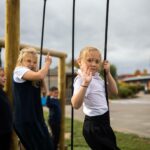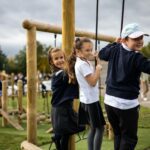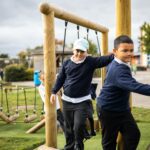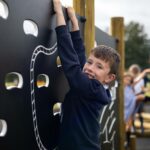
On our Year 4 page, you will find information about our current units of learning, homework, learning challenge questions, PE kit requirements, as well as any other information you may need.
In Year 4, we cover six fantastic units of learning:
Autumn 1: How did Britain change between the end of the Iron Age and the end of the Roman occupation?
During this period of history, Britain underwent significant changes as it transitioned from a society dominated by Celtic tribes to one that was part of the mighty Roman Empire. Through interactive activities and engaging discussions, students will gain a deeper understanding of this fascinating period of British history.
We will explore the key events and developments that took place, including the Roman invasion of Britain and the changes that were made to the country’s infrastructure, economy, and culture. We will learn about the resistance of the Celtic tribes and the impact that this had on the Roman occupation.
Autumn 2 : How do we energise ourselves in the UK?
In their captivating journey of discovery, our young learners will delve into the fascinating subject of “How do we energise ourselves in the UK?” Through a series of engaging lessons and hands-on activities, our pupils will unravel the secrets behind the various energy sources that power our nation. From wind turbines and solar panels to fossil fuels and hydroelectricity, our students will gain a deeper understanding of how we obtain and utilise energy to meet our needs. Get ready to witness their curiosity ignite as they explore the dynamic world of energy right here in the United Kingdom!
Energise the UK Knowledge Organiser
Electricity Knowledge Organiser
Wind Turbine Knowledge Organiser
Spring 1:How are mountains formed and what causes an earthquake or volcano?
Greetings, Year 4 explorers! Are you ready to embark on an exciting journey to unravel the mysteries of our planet’s most awe-inspiring natural phenomena – mountains, earthquakes, and volcanoes? Prepare to delve into the fascinating science behind these mighty forces and discover how they have shaped our world’s landscape.
Classification Knowledge Organiser
Spring 2: What did the Ancient Greeks bring to the world?
Welcome to our exciting half-term curriculum on Ancient Greece for Year 4 pupils! This term, we will be learning about the incredible legacy that the ancient Greeks have left us. From the Olympic Games to democracy, the Greeks have made significant contributions to the world that we live in today. We will explore the myths and legends of ancient Greece, including the stories of gods and heroes that have captivated audiences for thousands of years. We will also learn about the incredible achievements of the Greeks in areas such as art, architecture, literature, and philosophy, and how their ideas have shaped the world we live in.
Summer 1: How did the Industrial Revolution shape the UK we know today?
This half term, we will be exploring the fascinating unit of learning of the Industrial Revolution and its impact on modern-day life in the UK. From the steam engine to the textile mills, we will delve into the key inventions and innovations that shaped this period of rapid change and transformation. Pupils will learn about the social, economic, and political consequences of the Industrial Revolution, and how it paved the way for the modern world we live in today…
Ind.Revolution Knowledge Organiser
Summer 2: Why do so many people go to the Mediterranean for their holidays?
This half-term curriculum on the Mediterranean! This term, we will be exploring why so many people choose to go on holiday to this beautiful region of the world. Through interactive activities and engaging discussions, pupils will learn about the geography and climate of the Mediterranean, as well as the cultural attractions and natural wonders that make it such a popular destination.
Homework:
We will be setting weekly homework on Doodle Maths, English and Spelling related to our week’s learning, and we will have a weekly class battle on Times Tables Rock Stars.
Each week, we expect the pupils to complete their homework on the three Doodle platforms: Doodle Maths, Doodle English and Doodle Spellings.
In addition to Doodle, we expect the pupils to be reading at least 4 times a week and learning their weekly spellings.

P.E. Days:
This term, the children will need their PE kits in school for a Monday and a Friday. We suggest the children bring their kit in at the beginning of the week and leave it in school until they finish the week on Friday.
PE Kit:
We ask the children to bring fleeces and jogging trousers as well as outdoor footwear (if required during the colder months of the year), as the children will have an indoor and an outdoor session each week. This should include:
- White T-shirt
- Navy shorts (indoor PE)
- Plimsolls/trainers
- Navy or black tracksuit top and bottoms (for colder weather)

Swimming:
TBD
Key Dates:
Swimming – TBD
Production (performance to school) – TBD
Production (performance to parents) – TBD
Meet the Teaching Staff
Mr Holland – Much the Miller’s Son (4CH)
Mrs Roy-Garfield – Merry Men (4TR)
We are also fortunate to be supported by:
Mrs Knowles
Miss Booth
Mr Kirkwood (Sports)
Mrs Willis (Language and Music Expert)
The word-lists for years 3 and 4 are statutory (Gov.uk). The lists are a mixture of words pupils frequently use in their writing and those which they often misspell. Some of the listed words may be thought of as quite challenging, but the 100 words in each list can easily be taught within the two years of lower key stage 2 alongside other words that teachers consider appropriate.
In Year 5 and 6 (Upper Key Stage 2, children will have another statutory list of words.
Year 4 Letters
Quality Texts:
What is the Power of Reading?
The Power of Reading is CLPE’s proven professional development programme that supports pupils to develop reading comprehension and writing composition, and fosters a whole school love of reading and writing.
The Power of Reading puts quality children’s literature at the heart of English learning and is built on years of research and best practice.
Below is a list of quality texts that children in year 4 will be accessing this year to support and enhance their learning. We try to link our class text with our history/geography units of learning:
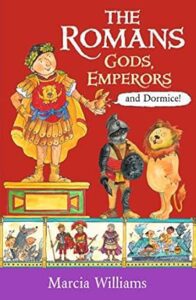
Autumn 1:
In Marcia Williams’ engaging and humorous historical retelling, The Romans: Gods, Emperors and Dormice, readers are guided through the lively and often outrageous world of ancient Rome by a witty narrator—Felix, a clever dormouse. With a scroll in paw and a knack for storytelling, Felix walks us through the grand rise and dramatic fall of the Roman Empire, offering snapshots of key events and colourful characters.
From the founding myths of Romulus and Remus to the rule of legendary emperors like Julius Caesar and Nero, the book combines comic-strip illustrations, facts, and commentary to bring Roman history vividly to life. Along the way, readers encounter Roman gods, gladiators, soldiers, and citizens, all woven into a narrative that blends education with entertainment. Through Felix’s amusing perspective, the book captures the grandeur, absurdity, and everyday life of Rome in a way that is both accessible and memorable for young readers.
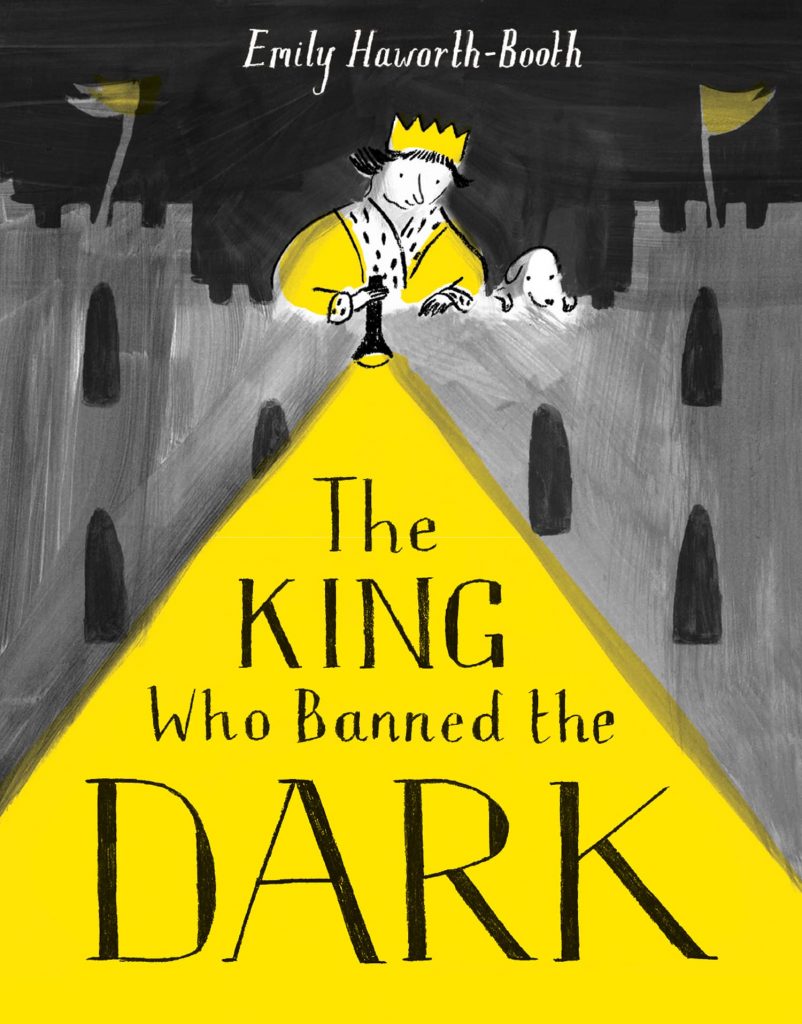
Autumn 2:
In Emily Haworth-Booth’s enchanting and thought-provoking tale, The King Who Banned the Dark, a young prince, deeply afraid of the dark, grows up to become a king who decrees a permanent ban on darkness in his kingdom. Determined to shield himself from his fear, he enforces measures to flood the kingdom with artificial light, plunging the realm into perpetual brightness. While at first, his subjects obey the mandate, they soon grow weary of never-ending daylight and the toll it takes on their lives and wellbeing. Resistance begins to swell, as the citizens long for the return of natural rhythms, the stars, and rest. The king, initially steadfast and stubborn, is challenged by the growing discontent and clever acts of rebellion. In time, he comes to understand that his attempts to control and eliminate the dark have caused greater harm than good. Realizing his error, he lifts the ban and learns to make peace with the dark. Through humor, allegory, and poignant imagery, Haworth-Booth explores themes of fear, control, balance, and acceptance, offering readers a resonant tale about the necessity of embracing both light and darkness in life.
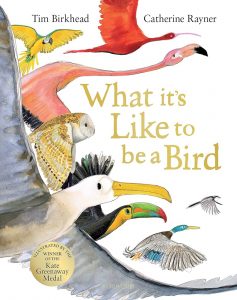
Spring 1:
In David Allen Sibley’s captivating and richly illustrated work, What It’s Like to Be a Bird, readers are invited to explore the world from a bird’s-eye view, immersing themselves in the lives of these fascinating creatures. Sibley goes beyond mere identification, bringing to life the unique behaviors, sensory experiences, and adaptations that define a bird’s existence. From the soaring migrations of majestic hawks to the intricate courtship displays of songbirds, he delves into the incredible variety of avian life and reveals surprising insights about how birds perceive their environment. Blending meticulous scientific detail with accessible language, Sibley answers questions about why birds sing, how they navigate vast distances, and the complex ways they communicate and cooperate. His deep appreciation for birds shines through, encouraging readers to marvel at their resilience, intelligence, and beauty. Throughout this enlightening journey, Sibley underscores the interconnectedness of all living beings and offers a profound appreciation for the diverse and remarkable lives of birds.
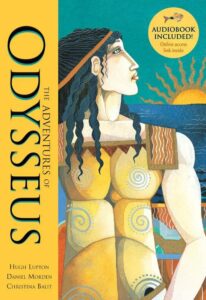
Spring 2:
In Hugh Lupton’s captivating retelling of Homer’s epic poem, The Odyssey, the renowned hero Odysseus embarks on a perilous ten-year journey home from the Trojan War. Guided by his cunning and resilience, Odysseus faces a series of daunting trials, encountering monstrous creatures, seductive temptresses, and cunning gods along the way. His unwavering determination and resourcefulness enable him to overcome each obstacle, demonstrating his unwavering spirit and earning him his rightful place as a legendary hero. Through his extraordinary adventures, Odysseus sheds light on the complexities of human nature, exploring themes of loyalty, love, and the enduring power of the human spirit to persevere against adversity.
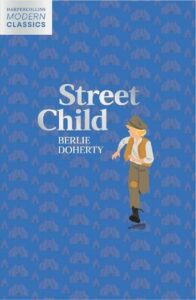
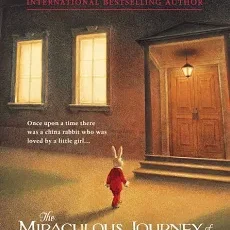
Summer 1:
In Berlie Doherty’s poignant and historically resonant novel, Street Child, Jim Jarvis, a young boy orphaned in the harsh environment of Victorian London, navigates the unforgiving streets of the city, yearning for a semblance of stability and compassion. After escaping the clutches of the workhouse, Jim encounters a harsh world of poverty, exploitation, and the harsh realities of child labor. Amidst the struggles, he finds fleeting moments of kindness and camaraderie, forging bonds with street children like Shrimps and the compassionate cook Rosie. However, his hope for a better life is shattered when he falls under the control of Grimy Nick, a ruthless coal boat owner who subjects Jim to grueling labor and brutal treatment. Through Jim’s harrowing experiences, Doherty shines a light on the plight of destitute children in Victorian society, highlighting the challenges they faced and the resilience they exhibited in the face of adversity.
Autumn 2:
In Kate DiCamillo’s enchanting tale, The Miraculous Journey of Edward Tulane, an exquisite china rabbit named Edward embarks on an extraordinary journey through the hands of various owners, each leaving an indelible mark on his heart. From the pampered indulgence of his young owner, Abilene Tulane, to the depths of the ocean and the humble care of a fisherman’s family, Edward’s travels are a poignant exploration of the power of love, loss, and the enduring spirit of friendship. Through his encounters with diverse individuals, Edward gradually sheds his self-centered arrogance and discovers the true meaning of compassion and empathy.
School Diary
Pupils will be receiving a new school diary. This will be complete with important school information and can be used as a point of contact between parents and teachers. These diaries will be checked on a weekly basis. It is therefore the children’s responsibility to have them in school every day. Please feel free to comment on the reading children are doing at home. We encourage all parents to make a note of children’s reading as prizes will be awarded at the end of each half-term.
Reading is Fundamental. In fact, it is one of the most important ingredients to becoming all that you can be.
Reading develops the brain, provides a window into the world around you and helps you do better in all school subjects. We recommend that children are heard for at least fifteen minutes each night and notes to be made in their planners.
What the research would suggest:
• Parents and the home environment are essential to the early teaching of reading and fostering a love of reading; children are more likely to continue to be readers in homes where books and reading are valued (Clark and Rumbold, 2006).
• Reading for pleasure is strongly influenced by relationships between teachers and children, and children and families (Cremin et al, 2009).

